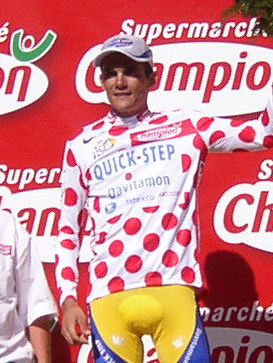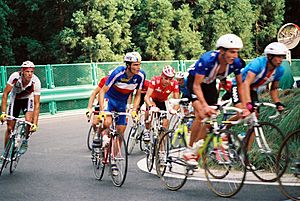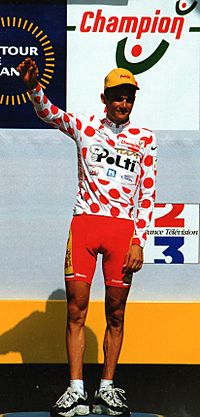Richard Virenque facts for kids

Virenque at the 2003 Tour de France
|
|||
| Personal information | |||
|---|---|---|---|
| Full name | Richard Virenque | ||
| Nickname | Ricco | ||
| Born | 19 November 1969 Casablanca, Morocco |
||
| Height | 1.79 m (5 ft 10+1⁄2 in) | ||
| Weight | 65 kg (143 lb; 10 st 3 lb) | ||
| Team information | |||
| Current team | Retired | ||
| Discipline | Road | ||
| Role | Rider | ||
| Rider type | Climbing specialist | ||
| Major wins | |||
|
|||
Richard Virenque (born 19 November 1969) is a retired French professional road racing cyclist. He was very popular with fans for his friendly personality and his exciting, long solo attacks during races. He was an amazing climber, best known for winning the King of the Mountains competition in the Tour de France a record seven times.
Contents
Early Life and First Rides
Richard Virenque grew up in Casablanca, Morocco, with his parents, brother Lionel, and sister Nathalie. His family was well-off. Richard was described as a kind boy who loved helping his mother in the garden. His hero was Michael Jackson.
His father, Jacques, ran a tire company. Richard started cycling by riding around their garden. He said his first bike was very simple, without mudguards or brakes. He often skipped school to go fishing at the beach.
In 1979, when he was nine, his family moved to La Londe-les-Maures in France. His parents later divorced, which made Richard very sad. He found comfort in cycling, saying, "I had only my bike, and I took to it in depth." He left school early to work as a plumber, but he admitted he often cycled instead of attending classes.
Starting a Cycling Career
At first, cycle racing didn't really interest Richard. His brother, Lionel, was into cycling and watched the Tour de France. One day, his brother took him to a race, and Richard decided to join a cycling school.
He joined the Vélo Club Hyèrois at age 13, encouraged by his grandfather. He quickly realized he was good at climbing hills. He said, "On the flat, I clung to the wheels in front as best I could, but the moment there was a hill, I left the others. I've always had that pleasure."
His first victory was in a race in La Valette-du-Var. He then completed his national service in the army, where talented athletes often served. In 1990, he finished eighth in the world championship road race in Japan, which helped him get a professional contract with the RMO team.
Becoming a Professional Cyclist
Richard Virenque became a professional cyclist in January 1991 with the RMO team. His first Tour de France was in 1992. He earned 15,000 francs a month and dreamed of keeping up with the best climbers.
On the third day of the 1992 Tour, he briefly wore the yellow jersey, which is given to the leader of the race. He held it for one day. He also finished second in the climbers' competition that year.
After his first Tour, many teams wanted him. He joined another French team, Festina, where he stayed until 1998. Virenque wore the yellow jersey again in 2003, winning a stage to Morzine. He was a great climber but not as strong in time trials.
He finished on the podium twice in the Tour de France, coming third in 1996 and second in 1997. He also won several individual stages, including the famous Mont Ventoux in 2002. He is one of only a few riders to have won Tour stages over a period of more than 10 years.
A Difficult Period
In 1998, the Festina cycling team faced a major challenge. During the 1998 Tour de France, a team staff member was found with banned substances. This led to an investigation.
Some of Virenque's teammates admitted to using certain substances and were disqualified from the Tour. Richard Virenque, however, insisted he was innocent for a long time.
While his former teammates returned to racing after a suspension, Virenque moved to a new team, Polti, in 1999. He rode in the 1999 Giro d'Italia and won a stage.
Later, during a court inquiry in 2000, Virenque eventually admitted to using banned substances. This was a very public moment, and his phrase "willingly but without knowing" became famous in France, often used to describe someone denying something obvious. A former team staff member, Willy Voet, also wrote a book about his experiences.
Life After Suspension
After his suspension, few teams wanted to sign Richard Virenque. However, with help from former Tour de France winner Eddy Merckx, he joined the Domo-Farm Frites team in 2001. He was paid the minimum wage at first, the same salary he earned when he first turned professional.
Virenque made a strong comeback by winning Paris–Tours in October 2001. This was a surprise win because Paris–Tours is a flat race, usually favoring sprinters, not climbers like Virenque. He crossed the finish line just seconds ahead of the main group of riders.
In 2003, he won his sixth mountains classification in the Tour de France, tying the record with other cycling legends. In 2004, he won it for a record seventh time.
Retirement and New Ventures
Richard Virenque retired from professional cycling after the Olympic Games road race in Athens in 2004. He announced his decision at the Olympia theatre in Paris.
After retiring, he remained in the public eye. In 2006, he won the French version of I'm a Celebrity... Get Me Out of Here! in Brazil. In 2005, he started Virenque Design, a company that designs and sells jewelry, often featuring the number 7 to represent his seven King of the Mountains titles.
Since 2005, he has worked as a cycling commentator for Eurosport. He has also promoted an energy drink and a pharmacy company. In 2005, he participated in the Spa 24 Hours endurance car race, finishing 12th overall.
In 2006, he had an accident during a mountain-bike race, breaking his nose and needing many stitches. This accident caused him to lose his sense of smell.
Personal Life
In December 2007, Richard Virenque and his wife, Stéphanie, divorced after 17 years. They have two children, Clara and Dario.
Richard Virenque lives in Carqueiranne, France. He enjoys marmots, dancing, wine, gardening, and flowers. He once said, "Put me in a good garden nursery and I'm in heaven."
Career Highlights
Richard Virenque had a remarkable career, especially known for his climbing abilities. Here are some of his main achievements:
- Won the Mountains classification in the Tour de France 7 times (1994, 1995, 1996, 1997, 1999, 2003, 2004).
- Won 7 individual stages in the Tour de France.
- Finished 2nd overall in the 1997 Tour de France.
- Finished 3rd overall in the 1996 Tour de France.
- Won 1 individual stage in the Giro d'Italia (1999).
- Won the Paris–Tours classic race in 2001.
- Won a bronze medal at the 1994 UCI Road World Championships.
See also
 In Spanish: Richard Virenque para niños
In Spanish: Richard Virenque para niños
 | William L. Dawson |
 | W. E. B. Du Bois |
 | Harry Belafonte |



